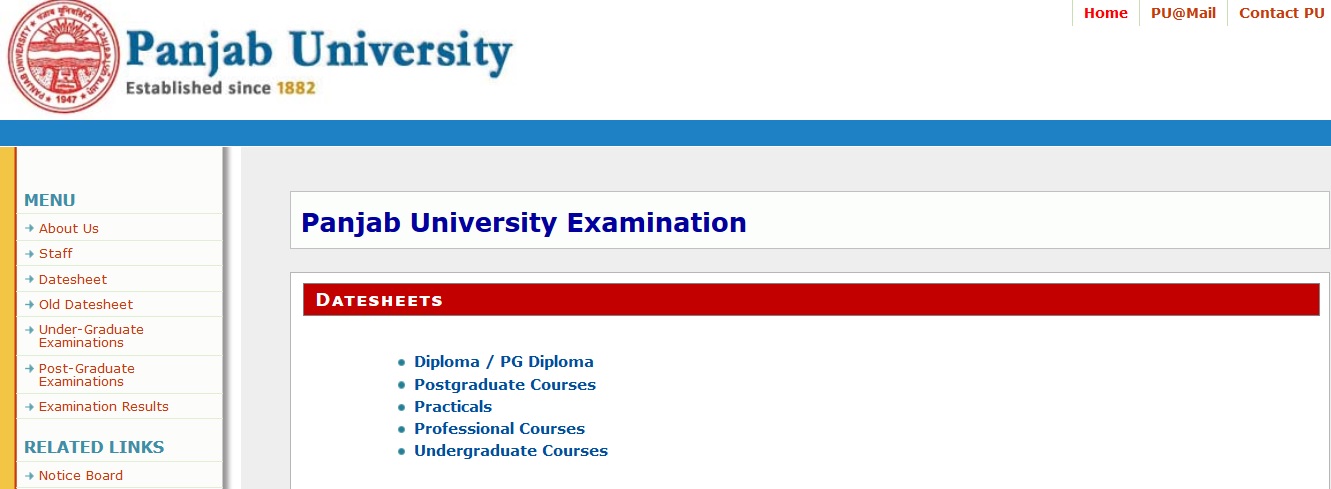exams.puchd.ac.in Legal & General Awareness CET Common Entrance Test Question Paper : Panjab University
University : Panjab University
Exam : Legal & General Awareness CET Common Entrance Test
Document Type : Question Booklet
Website :exams.puchd.ac.in
Download Model/Sample Question Paper :https://www.pdfquestion.in/uploads/exams.puchd.ac.in/5547-20110528144436-qp-l.pdf
Legal & General Awareness Question Paper
Booklet Series Code : A
Time : 90 minutes
Number of Questions : 100
Related : Panjab University M.Sc Industrial Chemistry OCET Other Common Entrance Test Question Paper : www.pdfquestion.in/5546.html
Maximum Marks : 100
1. The Constitution of independent India came into force on :
(A) 26 Jan. 1950 (B) 26 Aug. 1947 (C) 26 Aug. 1949 (D) 26 Jan. 1949
2. Which part of the Constitution reflects the vision and the aims of the founding
(A) Fundamental rights (B) Preamble
(C) Directive principles of state policy (D) Fundamental duties

3. A system of government in which individual states have control
(A) Unitary System (B) Federal System
(C) Socialist System (D) Republican System
4. The directive principles are given effect through :
(A) by the Constitution itself (B) by the orders of the executive
(C) by laws passed by the government (D) by the judiciary
5. India’s Constitution draws its authority from :
(A) the constitution itself (B) the parliament
(C) Judicial decisions (D) the people of India
6. Which of the following is not a Fundamental right –
(A) Right to life (B) Right to freedom of religion
(C) Cultural and educational right (D) Freedom to acquire,
7. Right to Education Act 2009 provides for free and compulsory education to :
(A) all illiterate children (B) all illiterate children as well as adults
(C) all children up to the age of 10 (D) children aged between 6 and 14
8. The Union legislature (Parliament) consists of :
(A) The Lok Sabha and The Rajya Sabha (B) The Lok Sabha only
(C) The Rajya Sabha only (D) The President and the two houses
9. The president of India can nominate _______ members from the Anglo Indian
(A) 1 (B) 2 (C) 3 (D) 4
10. A citizen can contest the Lok Sabha elections on reaching the age of :
(A) 18 years (B) 21 years (C) 25 years (D) 35 years
11. Who is the presiding officer of the Lok Sabha –
(A) President (B) Speake(C) Vice president (D) Chief Justice of India
12. Each member of the Rajya Sabha has a term of _______ years.
(A) 6 years (B) 5 years (C) 4 years (D) 3 years
13. The minimum age to become a member of the Rajya Sabha is _______ years.
(A) 30 years (B) 25 years (C) 35 years (D) 21 years
14. Indian Parliament to have at least _______ sessions an year.
(A) one (B) two (C) three (D) four
15. The first hour of every sitting of the Parliament is known as –
(A) Zero hour (B) Question hour (C) Debate hour (D) Discussion hour
16. The residuary powers with regard to law making are vested in the –
(A) Parliament (B) State legislature (C) Executive (D) Judiciary
17. Debates over issues of public interests are held during –
(A) Zero hour (B) Question hour (C) Debate hour (D) Discussion hour
18. Advisory jurisdiction can be exercised by ?
(A) Supreme Court only (B) High Court only
(C) District Court (D) Both by the Supreme Court and High Court
19. The Environment Act 1986 has been passed to give effect to which of the following ?
(A) Fundamental rights (B) Directive principles of State Policy
(C) Fundamental duties (D) Both (A) and (B) above
20. Art 40 of the Constitution provides for ?
(A) Free Legal Aid (B) Panchayati Raj
(C) Social Welfare (D) Separation of Judiciary from Executive
21. Draconian means ?
(A) harsh and severe (B) outdated
(C) not practical (D) impossible
22. The opposite of zenith is :
(A) nadir (B) bottom
(C) fathom (D) zilch
23. A person who willingly aids or consent in an activity, especially a criminal activity is called :
(A) accessory (B) ancillary
(C) attenuate (D) fait accompli
24. An official working in an organization or a government department, especially one who follows the rules of the department too strictly is called :
(A) bureaucrate (B) bureaucrat
(C) buraeucrate (D) buraeucrat
25. vox populi means :
(A) a famous personality (B) popular opinion
(C) a very popular drama (D) group of people